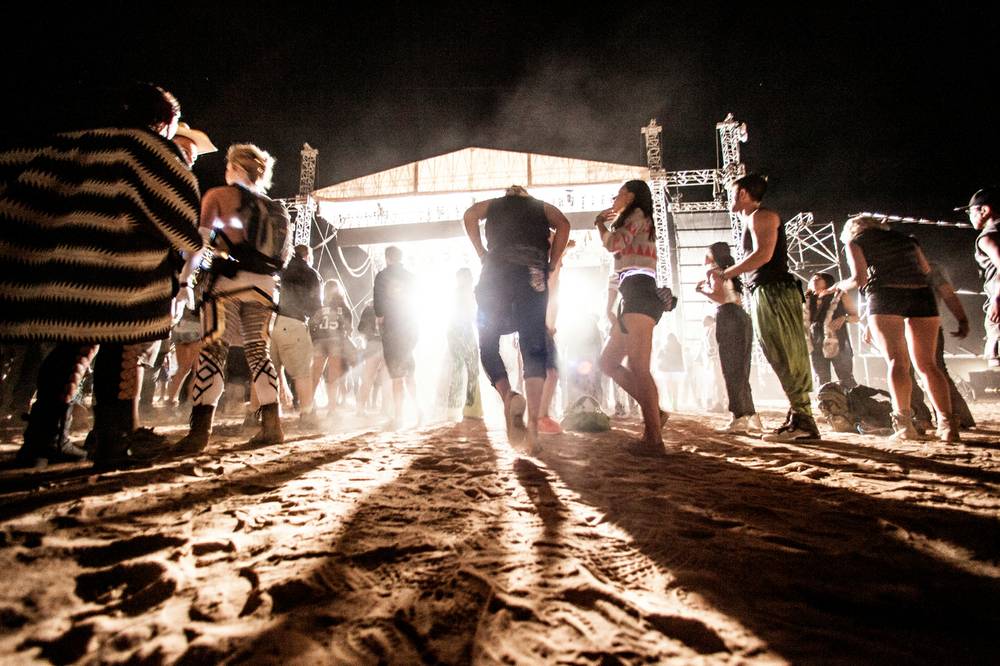Upon stepping onto the cleared but dusty grounds of the Moapa River Indian Reservation for the inaugural run of Further Future, my first thought was: Where is everything? The entire campus was visible, but I wanted a map to better orient myself, just as I do at any new festival. I never found one.
This may have been by design, as the dominant purpose of the music-heavy May 1-3 event seemed to be exploration. The more initiated one became, the more one discovered—and for a first-year festival, the rewards were plentiful.
Its chief component and draw was its music slate, one of the most progressive you’ll find for an American festival. Given the Burning Man pedigree of promoter Robot Heart, Further Future could have exclusively booked DJs. But instead, it booked a considerable complement of live acts, a decision that showed depth for a new festival, cultural relevance given the slowly building trend of electronic musicians opting to perform rather than play their material as a DJ (see: this year’s Coachella and Ultra Music Festival) and a commitment to being more than a party.
Take Spanish producer Henry Saiz, who used an Ableton Live setup alongside a percussionist and bassist/guitarist. The added dimension was immediately obvious—no doubt aided by the Mothership main stage’s superior sound system—in the robust snap of the beats and alternating vocals from the musicians. Though the set ended on a more familiar, almost pop-like note, Saiz’s set sounded like a modern update of late-1990s progressive house, a much-needed happy medium between the bombast of EDM and the increasing repetitiveness of deep/minimal house.
And then there was Damian Lazarus, whose new material with the Ancient Moons greatly improved in the live setting. It was tribal, soulful, organic-sounding and—like Saiz’s set, occasionally nostalgic, but still of the moment. It felt like a musical approximation of the festival itself, which may have been why the set drew one of the largest crowds of the festival
Live performance also served as real-time sonic explorations, like electronic/noise artist Tim Hecker’s early Saturday set, which was delayed to 4:30 a.m. but fortuitously transpired as the sun began to rise behind the mountains. It was such a gorgeous sight that even Hecker himself kept turning around to gaze upon it, seemingly pairing his ambient experiments with the changing atmosphere.
Sonic explorations weren't just limited to observational experiences. Participatory engagements abounded at the Wild Lotus pavilion, including the Gamelatron Gong Baths, where robotic arms struck a series of gongs in a pattern designed to rebalance its listeners and promote vitality, and the 432-hertz sound-therapy sessions, another foray into achieving both consciousness and therapeutic benefits. The latter provoked vivid thoughts I wasn’t accustomed to in my normal meditation practice and even more intense revivals once I re-established my presence and focus.
The Wild Lotus pavilion also led four yoga classes, the one I took proving that yoga is 10 times harder while being sleep-deprived, nearly dehydrated and bombarded with intermittent dust storms and 92-degree weather—and as such, 10 times more revitalizing, too. And talks on wellness and self-empowerment were offered there, with more future-minded discussions staged Saturday afternoon at the nearby, open-air Booba Cosmica structure, which looked like a multi-level series of platforms designed by MC Escher.
The talkers ranged from Soundcloud brass Alex Ljung and Eric Wahlforss, speaking about the future of music distribution, to Vegas’ own Tony Hsieh, adorned in flaired-out camouflage fatigues and giving his thoughts about the future of cities informed by his part in the ongoing development of Downtown Las Vegas. Impressively, the three-hour speaker series drew a capacity crowd despite taking place when the heat was at its most oppressive.
The monologue of Google[X]’s Astro Teller resonated the most with me as I returned to my tent for lunch. The thesis of his chat was officially “building the future,” but he emphasized that doing such a thing was only possible when one doesn’t run from failure, and even embraces it. When he called the future a “messy process,” it reminded me of Further Future itself, with its dustiness, incomplete structures and occasional lack of organization—imperfections we gladly endured so we could discover, over and over again, in ways we hadn’t before.






